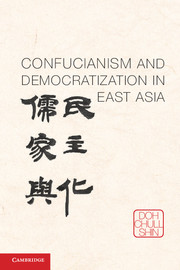Book contents
- Frontmatter
- Contents
- Acknowledgments
- Introduction
- Part i Confucianism and Confucian East Asia
- Part ii Upholding Confucian Legacies
- 3 Confucianism as a Hierarchical Way of Life
- 4 Confucianism as a Government of Paternalistic Meritocracy
- Part iii Engaging in Civic Life
- Part iv Embracing Democracy
- Part v Final Thoughts
- References
- Index
4 - Confucianism as a Government of Paternalistic Meritocracy
from Part ii - Upholding Confucian Legacies
Published online by Cambridge University Press: 05 June 2012
- Frontmatter
- Contents
- Acknowledgments
- Introduction
- Part i Confucianism and Confucian East Asia
- Part ii Upholding Confucian Legacies
- 3 Confucianism as a Hierarchical Way of Life
- 4 Confucianism as a Government of Paternalistic Meritocracy
- Part iii Engaging in Civic Life
- Part iv Embracing Democracy
- Part v Final Thoughts
- References
- Index
Summary
Confucius lived during one of the most politically and socially turbulent periods in Chinese history, a time known as the Spring and Autumn period (722–481 B.C.). During this period, China, formerly united under the Zhou dynasty, was divided into small feudal states, which engaged in repeated cycles of civil wars and political turmoil. Mencius (3B:9) describes this period in this way: “After the death of Yao and Shun, the way of the Sages declined, and tyrants arose one after another.… When the world declined and the Way fell into obscurity, heresies and violence again arose. There were instances of regicides and parricide. Confucius was apprehensive and composed the Spring and Autumn Annals.”
The people of Confucius's time desired to build a peaceful and harmonious community but struggled to restore social order and maintain political stability. Unlike medieval Europeans, however, their struggle did not center on how to “limit the power of established political authority, or secure a protected realm for individual conduct free from arbitrary coercion” (O’Dwyer 2003, 43). For Confucius and his followers, the goal was a government that promoted and secured a peaceful life for the people. Because limiting the power of established political authority was not necessarily the end sought, Confucius and his followers did not advocate the rule of law as an effective solution to the problem of incessant political strife and social disorder facing the warring states. Their main concern was how to establish and maintain a meritocratic government capable of creating datong shehui, or a community of grand harmony (Yao 2000, 275).
- Type
- Chapter
- Information
- Confucianism and Democratization in East Asia , pp. 106 - 140Publisher: Cambridge University PressPrint publication year: 2011
- 1
- Cited by



